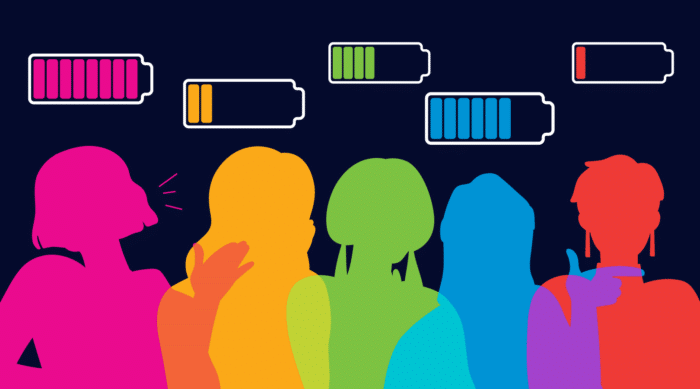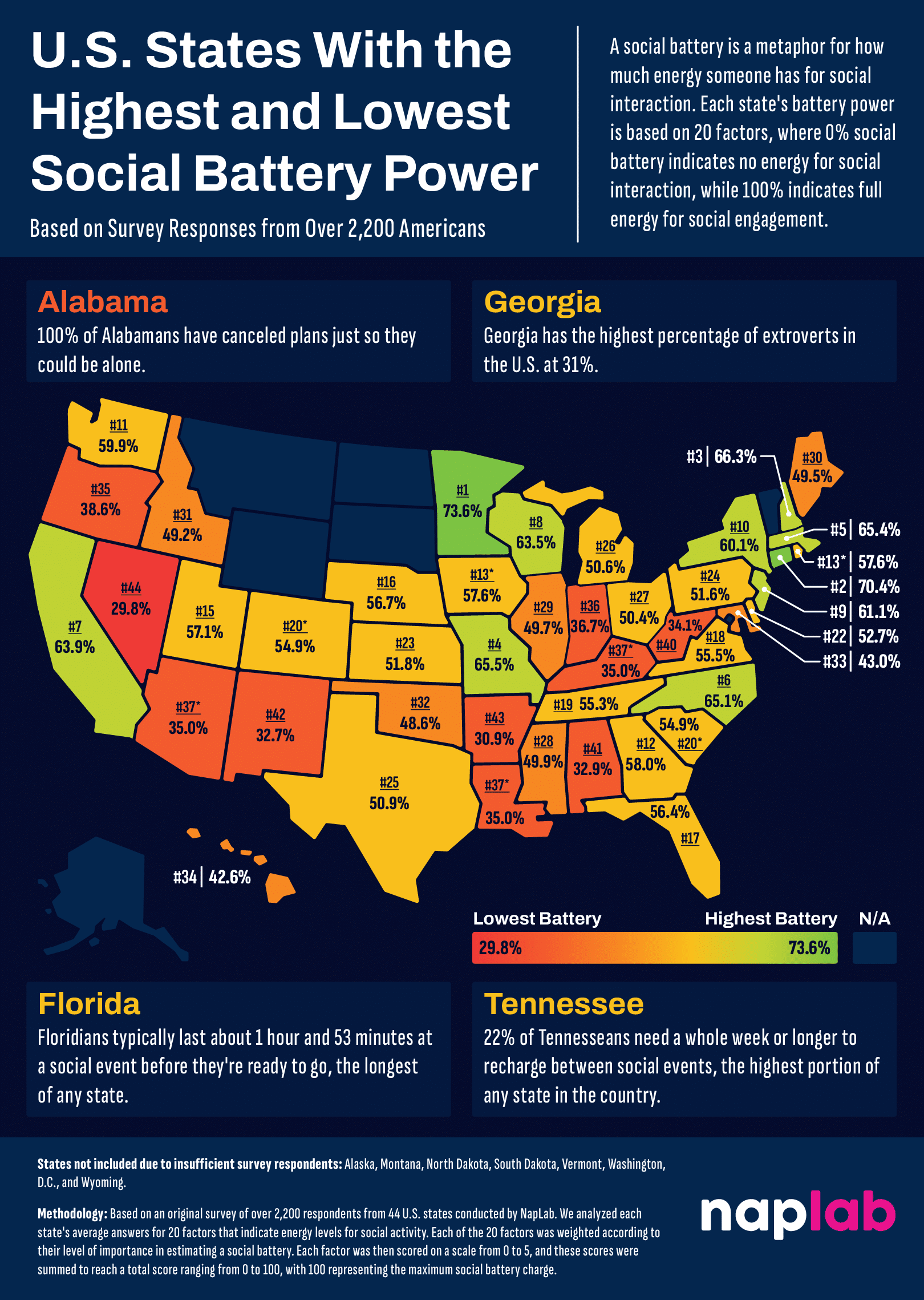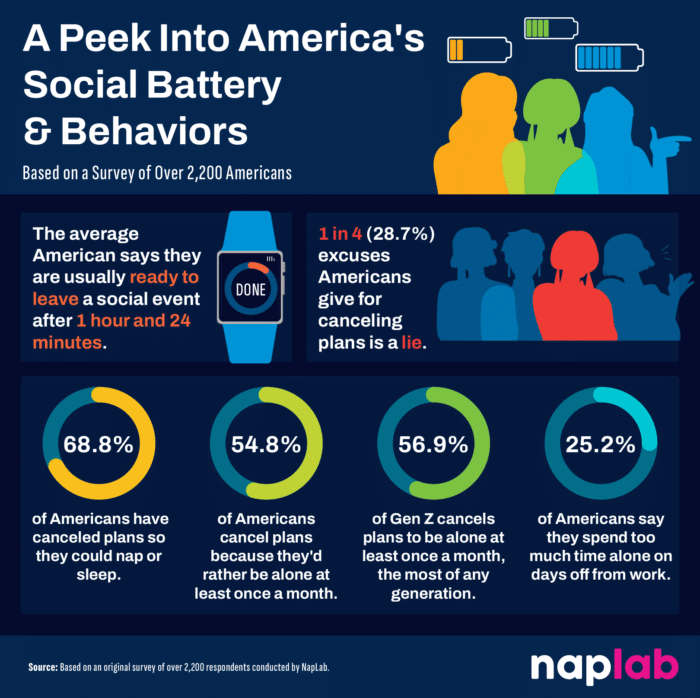Are you the type of person who breathes a sigh of relief when plans get canceled? Or do you live for packed weekends filled with plans and spontaneous meetups? Whether you thrive on social interaction or prefer to decompress solo, your social battery—the amount of energy you have for social interaction before needing to recharge—says a lot about your habits, and where you live may play a role, too.

To uncover how social Americans really are, we asked residents across the country to reflect on their social habits. Then, we compared each state’s average answers to calculate a social battery percentage that best represents them. From how often they cancel plans to the ideal length of a hangout, our survey reveals which states are home to the most social butterflies and who’s more likely to hang out with their comfy bed.
Key Findings
- Minnesota has the highest social battery percentage at 73.6%
- Nevada has the lowest social battery at 29.8%
- The national average social battery charge is 51.4%
- The average American only wants about 5 hours of social time a week.
- Events should be kept short—after 1 hour and 24 minutes, the average American is ready to leave.
The Social Batteries of Every U.S. State
When it comes to social stamina, there’s a noticeable difference in how much energy Americans have for social interaction—and some states are clearly leading the charge. Minnesota tops the list with an impressive 73.6% social battery, suggesting that Minnesotans have the energy to juggle back-to-back plans without skipping a beat. Following closely behind are Connecticut (70.4%) and New Hampshire (66.3%), rounding out a surprisingly social top three.
The Midwest and Northeast dominate the upper rankings, with states like Missouri, Wisconsin, and Massachusetts landing high on the list. Meanwhile, social butterflies from California (63.9%) and New York (60.1%) prove that even fast-paced urban living doesn’t necessarily drain your battery.
On the other end of the spectrum, states like Nevada (29.8%), Arkansas (30.9%), and New Mexico (32.7%) rank among the lowest, signaling a preference for rest and quiet over long social outings. In Alabama, for example, 100% of respondents admitted to canceling plans just to spend time alone—the ultimate sign of a drained social battery.
Some states show interesting outliers. Floridians, despite ranking near the middle at 56.4%, have the longest social event stamina, lasting almost 1 hour and 53 minutes at functions before they feel the urge to leave. In contrast, Tennessee stands out with 22% of residents saying they need a full week or longer to recover after socializing, the highest in the country.
America’s Social Battery & Behaviors
Social Habits by the Numbers
Our survey shines a light on just how much (or how little) social interaction Americans can handle before tapping out:
- The average American is ready to head home after just 1 hour and 24 minutes at a social event—a quick pit stop for extroverts but a marathon for introverts.
- When it comes to canceling plans, nearly 1 in 4 of American’s excuses (28.7%) aren’t true. Whether it’s a “family emergency” or “feeling under the weather,” sometimes the real reason is simply a need for rest, as 68.8% of Americans admit to canceling plans specifically to nap or sleep.
- For over half of Americans (54.8%), choosing solitude over socializing is a monthly habit. Gen Z leads the pack, with 56.9% saying they regularly cancel plans to enjoy time alone—perhaps signaling a generational shift toward prioritizing personal downtime.
- On the flip side, 25.2% of Americans say they spend too much time alone during their days off, showing that finding the right social balance can be tricky.
A Complete Look at Each State’s Social Battery
How does your social battery compare to your neighbors? Check out the interactive table to find out more about your state’s energy for social activity!
Closing Thoughts
Whether you’re the life of the party or in low power mode, one thing is clear: balancing social time with rest is essential. The fear of missing out can be tough to overcome, but there is never anything wrong with taking a little time alone. Besides, if you ever need extra social time, now you know where to look for it!
At NapLab, we know that no matter your social style, quality rest is the key to recharging. Whether you’re recovering from a big event or gearing up for your next outing, prioritizing a good nap or a solid night’s sleep can make all the difference. Take our mattress quiz for personalized mattress recommendations, or check out our guide to better sleep to improve your quality of rest starting tonight.
Methodology
A social battery is a metaphor for how much energy someone has for socializing. To calculate each state’s social battery, we asked over 2,200 survey respondents from across the United States of America* 13 questions about their social activity, introversion, propensity to cancel social events, and more.
Then, we analyzed each state’s average answers based on 20 factors that indicate social battery or energy for social interaction, ranging from each state’s percentage of extroverts to their average preferred number of hours of social time per week.
Each of the 20 factors was weighted according to their level of importance in estimating a social battery. Each factor was then scored on a scale from 0 to 5, and these scores were summed to reach a total score ranging from 0 to 100, with 100 representing the maximum social battery charge. 0% indicates having no energy for social interaction, and 100% indicates always having energy for social interaction.
*States not included due to insufficient survey respondents: Alaska, Montana, North Dakota, South Dakota, Vermont, Washington, D.C., and Wyoming.





